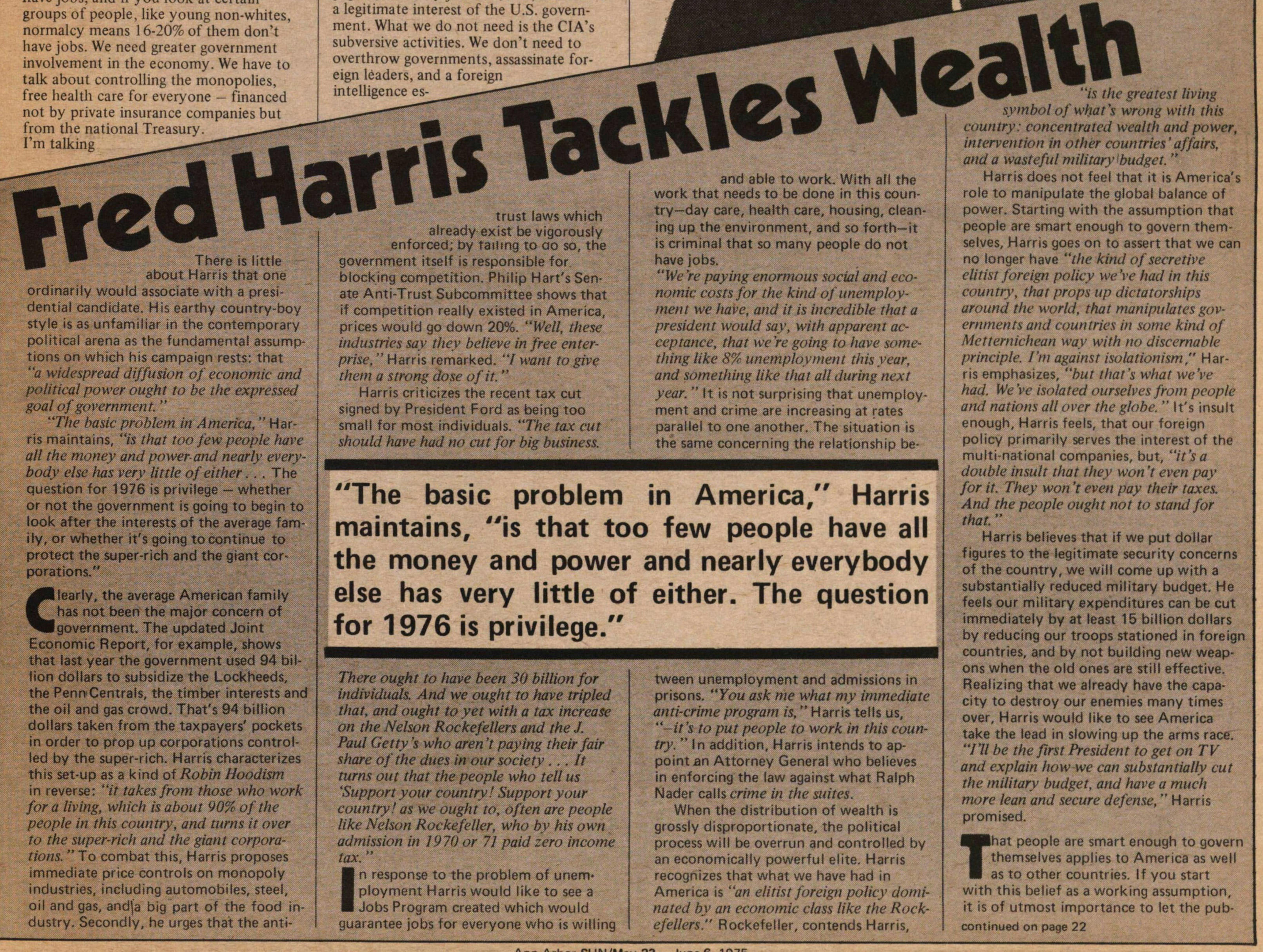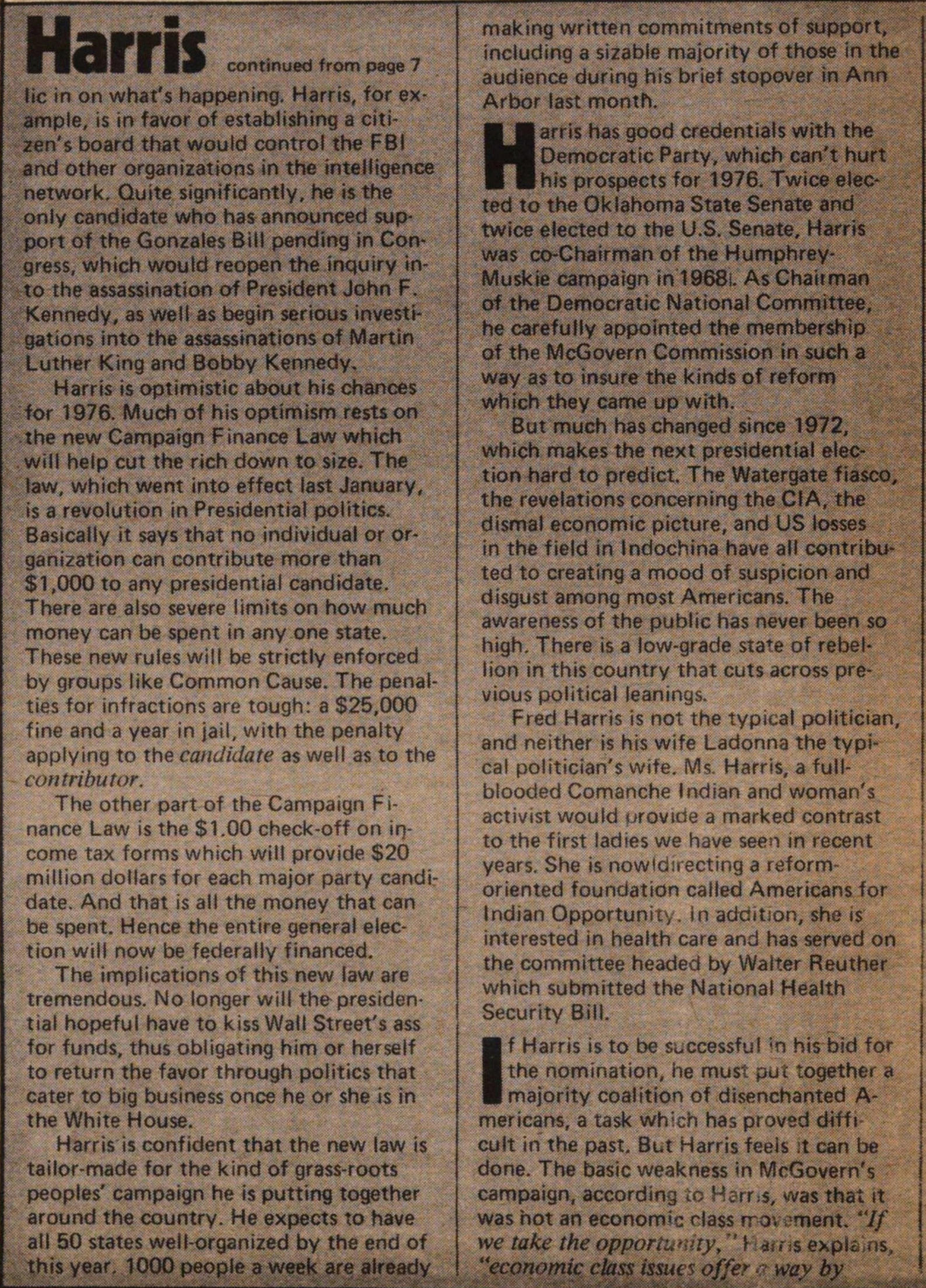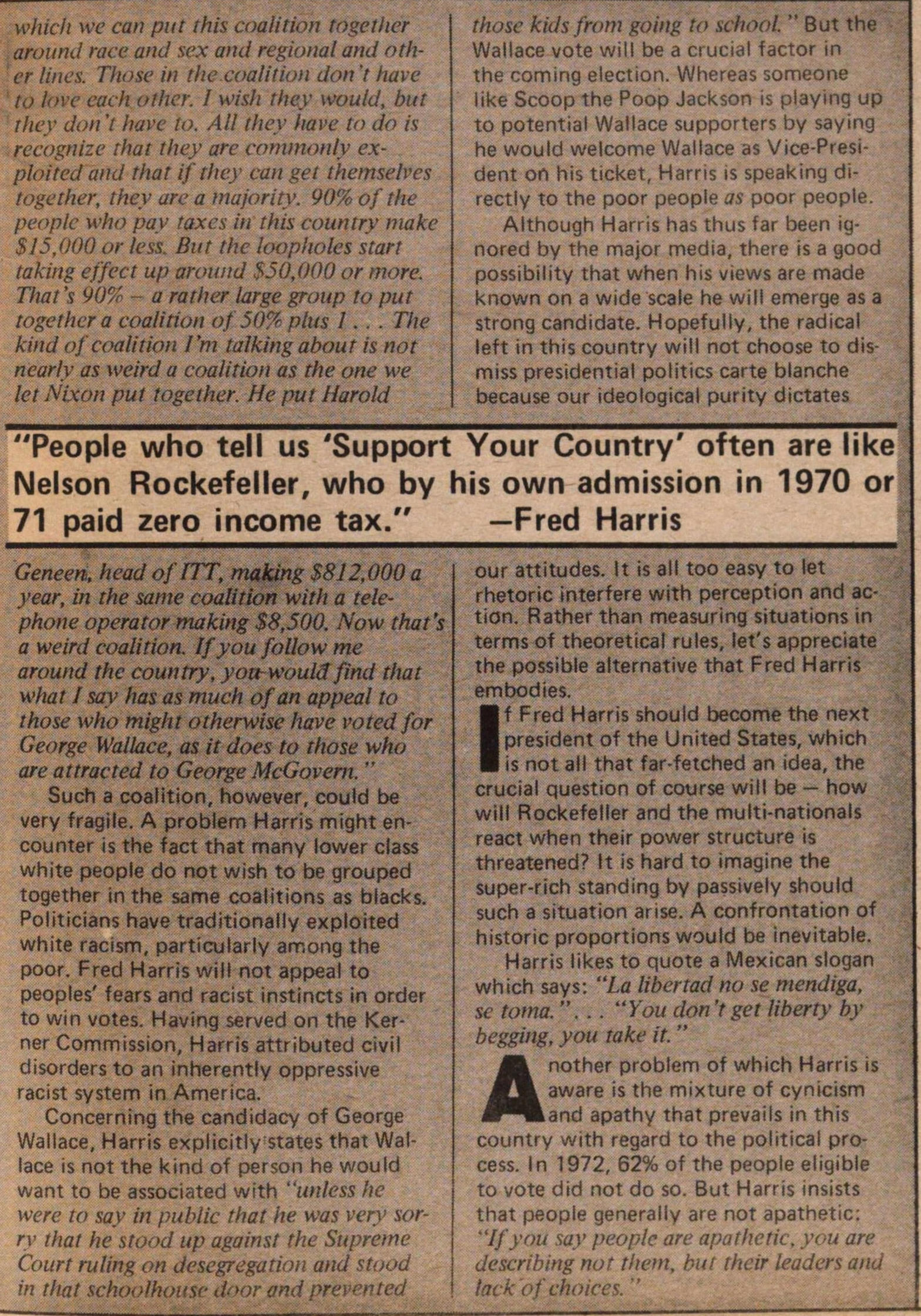Fred Harris Tackles Wealth



There is little about Harris that one ordinarily would associate with a presidential candidate. His earthy country-boy style is as unfamiliar in the contemporary political arena as the fundamental assumptions on which his campaign rests: that "a widespread diffusion of economic and political power ought to be the expressed goal of government."
"The basic problem in America, " Harris maintains, "is that too few people have all the money and and nearly everybody else has very little of either...The question for 1976 is privilege - whether or not the government is going to begin to look after the interests of the average family, or whether it's going to continue to protect the super-rich and the giant corporations."
Clearly, the average American family has not been the major concern of government. The updated Joint Economic Report, for example, shows that last year the government used 94 billion dollars to subsidize the Lockheads, the PennCentrals, the timber interests and the oil and gas crowd. That's 94 billion dollars taken from the taxpayers' pockets in order to prop up corporations controlfed by the super-rich. Harris characterizes this set-up as a kind of Robin Hoodism in reverse: "it takes from those who work for a living, which is about 90% of the people in this country, and turns it over to the super-rich and the giant corporations. " To combat this, Harris proposes immediate price controls on monopoly industries, including automobiles, steel, oil and gas, and big part of the food industry. Secondly, he urges that the trust laws which already exist be vigorously enforced; by failing to do so, the government itself is responsible for blocking competition. Philip Hart's Senate Anti-Trust Subcommittee shows that if competition really existed in America, prices would go down 20%. "Well, these industries say they believe in free enterprise," Harris remarked. "I want to give them a strong dose of it. "
Harris criticizes the recent tax cut signed by President Ford as being too small for most individuals. "The tax cut should have had had no cut for big business. There ought to have been 30 billion for individuals. And we ought to have tripled that, and ought to vet with a tax increase on the Nelson Rockefellers and the J. Paul Getty's who aren t paying their fair share of the dues in our society...It turns out that the people who tell us 'Support your country! Support your country! as we ought to, often are people like Nelson Rockefeller, who by his own admission in 1970 or 71 paid zero income tax."
In response to the problem of unemployment Harris would like to see a Jobs Program created which would guarantee jobs for everyone who is willing and able to work. With all the work that needs to be done in this country-day care, health care, housing, cleaning up the environment, and so forth-it is criminal that so many people do not have jobs.
"We're paying enormous social and economic costs for the kind of unemployment we have, and it is incredible that a president would say, with apparent acceptance, that we're going to have something like 8% unemployment this year, and something like that all during next year." It is not surprising that unemployment and crime are increasing at rates parallel to one another. The situation is the same concerning the relationship between unemployment and admissions in prisons. "You ask me what my immediate anti-crime program is," Harris tells us, "-it's to put people to work in this country." In addition, Harris intends to appoint Attorney General who believes in enforcing the law against what Ralph Nader calls crime in the suites.
When the distribution of wealth is grossly disproportionate, the political process will be overrun and controlled by an economically powerful elite. Harris recognizes that what we have had in America is "an elitist foreign policy dominated by an economic class like the Rockefeilers." Rockefeller, contends Harris, "is the greatest living symbol of what's wrong with this country: concentrated wealth and power, intervention in other countries' affairs, and a wasteful military budget."
Harris does not feel that it is America's role to manipulate the global balance of power. Starting with the assumption that people are smart enough to govern themselves, Harris goes on to assert that we can no longer have "the kind of secretive elitist foreign policy we've had in this country, that props up dictatorships around the world. that manipulates governments and countries in some kind of Metternichean way with no discernable principle, l'm against isolationism ," Harris emphasizes, "but that's what we've had. We've isolated ourselves from people and nations all over the globe." It's insult enough, Harris feels, that our foreign policy primarily serves the interest of the multinational companies, but, "it's a double insult that they won't even pay for it. They won't even pay their taxes. And the people ought not to stand for that."
Harris believes that if we put dollar figures to the legitimate security concerns of the country, we will come up with a substantially reduced military budget. He feels our military expenditures can be cut immediately by at least 15 billion dollars by reducing our troops stationed in foreign countries, and by not building new weapons when the old ones are still effective. Realizing that we already have the capacity to destroy our enemies many times over, Harris would like to see America take the lead in slowing up the arms race. 'I'll be the first President to get on TV and explain how we can substantially cut the military budget, and have a much more lean and secure defense," Harris promised.
That people are smart enough to govern themselves applies to America as well as to other countries. If you start with this belief as a working assumption, it is of utmost importance to let the pubic on whats happening. Harris, for example, is in favor of establishing a citizen's board that would control the FBI and other organizations in the intelligence network. Quite significantly, he is the only candidate who has announced support of the Gonzales Bill pending in Congress, which would reopen the inquiry into the assassination of President John F. Kennedy, as well as begin serious investigations into the assassinations of Martin Luther King and Bobby Kennedy.
Harris is optimistic about his chances for 1976. Much of his optimism rests on the new Campaign Finance Law which will help cut the rich down to size. The law, which went into effect last January, is a revolution in Presidential politics. Basically it says that no individual or organization can contribute more than $1,000 to any presidential candidate. There are also severe limits on how much money can be spent in any one state. These new rules will be strictly enforced by groups like Common Cause. The penalties for infractions are tough: a $25,000 fine and a year in jail, with the penalty applying to the candidate as well as to the contributor.
The other part of the Campaign Finance Law is the $1.00 check-off on on income tax forms which will provide $20 million dollars for each major party candidate. And that is all the money that can be spent. Hence the entire general election will now be federally financed.
The implications of this new law are tremendous. No longer will presidential hopeful have to kiss Wall Street's ass for funds, thus obligating him or herself to return the favor through politics that cater to big business once he or she is in the White House.
Harris is confident that the new law is tailor-made for the kind of grass-roots peoples' campaign he is putting together around the country. He expects to have all 50 states well-organized by the end of this year, 1000 people a week are already making written commitments of support, including a sizable majority of those in the audience during his brief stopover in Ann Arbor last month.
Harris has good credentials with the Democratie Party, which can't hurt his prospects for 1976. Twice elected to the Oklahoma State Senate and twice elected to the U.S. Senate, Harris was co-Chairman of the Humphrey Muskie campaign in 19681. As Chairman of the Democratic National Committtee, he carefully appointed the membership of the McGovern Commission in such a way as to insure the kinds of reform which they came up with.
But much has changed since 1972, which makes the next presidential election hard to predict. The Watergate fiasco, the revetations concerning the CIA, the dismal economie picture, and US losses in the field in Indochina have all contributed to creating a mood of suspicion and disgust among most Americans. The awareness of the public has never been so high. There is a low-grade state of rebellion in this country that cuts across previous political leanings.
Fred Harris is not the typical politician, and neither is his wife Ladonna the typical politician's wife. Ms. Harris, a full-blooded Comanche Indian and woman's activist would provide a marked contrast to the first ladies we have seen in recent years. She is now directing a reform-oriented foundation called Americans for Indian Opportunity. In addition, she is interested in health care and has served on the committtee headed by Walter Reuther which submitted the National Health Security Bill.
If Harris is to be successful in his bid for the nomination, he must put together a majority coalition of disenchanted Americans, a task which has proved difficult in the past, But Harris feels it can be done. The basic weakness in McGovern's campaign, according to Harris, was that it was not an economic class movement. "If we take the opportunity, " Harris explains, "economic class issues offer a way by which we can put this coalition together around race and sex and regional and other lines. Those in the coalition don't have to love each other. I wish they would, but they don't have to. All they have in do is recognize that they are commonly exploited and that if they can get themselves together, they are a majority. 90% of the people who pay taxes in this country make $15,000 or less. But the loopholes start taking effect up around $50,000 or more. That's 90% - a rather large group to put together a coalition of 50% plus 1...The kind of coalition I'm talking about is not nearly as weird a coalition as the one we let Nixon put together. He put Harold Geneen, head of ITT, making $812,000 a year, in the same coalition with a telephone operator making $8,500. Now that's a weird coalition. If you follow me around the country, you would find that what I say has as much of an appeal to hose who might otherwise have voted for George Wallace, as it does to those who are attracted to George McGovern."
Such a coalition, however, could be very fragile. A problem Harris might encounter is the fact that many lower class white people do not wish to be grouped together in the same coalitions as blacks. Politicians have traditionally exploited white racism, particularly among the poor. Fred Harris wili not appeal to peoples' fears and racist instincts in order to win votes. Having served on the Kerner Commission, Harris attributed civil disorders to an inherently oppressive racist system in America.
Concerning the candidacy of George Wallace, Harris explicitly states that Wallace is not the kind of person he would want to be associated with "unless he were to say in public that he was very sorry that he stood up against the Supreme Court ruling on desegregation and stood in that schoolhouse door and prevented those kids from going to school. " But the Wallace vote will be a crucial factor in the coming election. Whereas someone like Scoop the Poop Jackson is playing up to potential Wallace supporters by saying he would welcome Wallace as Vice-President on his ticket, Harris is speaking directly to the poor people as poor people.
Although Harris has thus far been ignored by the major media, there is a good possibility that when his views are made known on a wide scale he will emerge as a strong candidate. Hopefully, the radical left in this country will not choose to dismiss presidential politics carte blanche because our ideological purity dictates our attitudes. It s all too easy to let rhetoric interfere with perception and action. Rather than measuring situations in terms of theoretical rules, let's appreciate the possible alternative that Fred Harris embodies.
If Fred Harris should become the next president of the United States, which is not all that far-fetched an idea, the crucial question of course will be - how will Rockefeller and the multi-nationals react when their power structure is threatened? It is hard to imagine the super-rich standing by passively should such a situation arise. A confrontation of historic proportions would be inevitable.
Harris likes to quote a Mexican slogan which says: "La libertad no se mendiga, se toma."..."You don t get liberty by begging, you take it."
Another problem of which Harris is aware is the mixture of cynicism and apathy that prevails in this country with regard to the political process. In 1972, 62% of the people eligible to vote did not do so. But Harris insists that people generally are not apathetic: "If you say people are apathetic, you are describing not them, but their leaders and lack of choices."
"People who tell us 'Support Your Country' often are like Nelson Rockefeller, who by his own admission in 1970 or 71 paid zero ncome tax." - Fred Harris
Article
Subjects
Freeing John Sinclair
Old News
Ann Arbor Sun